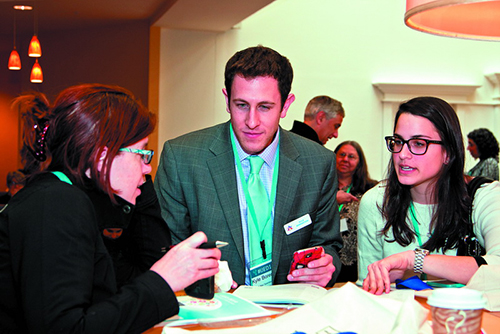

New York—Yeshiva University’s Institute for University-School Partnership co-hosted iJED 2014, a conference focusing on innovation in Jewish education, at the Long Island Marriott in Uniondale, NY, March 2-4.
Unlike traditional conferences, the event was structured to create a more interactive and in-depth learning and networking experience by modeling “flipped learning,” a cutting-edge educational technique in which students review lectures and materials at home and use class time for peer discussion and problem-solving with teachers. Conference organizers, including the Schechter Day School Network, Curriculum 21, Maytiv/IDV Herziliya School of Psychology, Koren Publishers Jerusalem, Gateways Access to Jewish Education and PEJE, shared learning materials with participants weeks in advance and invited them to engage in online discussion communities in preparation for iJED.
The conference’s unique structure embodied its goal: to bring Jewish day schools of all backgrounds together to model and engage in an ongoing dialogue about best practices in 21st century teaching and learning. iJED2014 is a direct result of the work that the YU School Partnership does on a daily basis with the schools in their network to foster connectivity and collaboration between schools, school leaders, and teachers. The YU School Partnership remains committed to organizing programs on a small and large scale throughout the year as part of its strategic support and development of Jewish day schools and their leaders.
More than 500 school and lay leaders, foundations, teachers, and educational experts from across North America attended the conference, which kicked off with Teacher Day, a full day designed to address the unique needs and challenges teachers face. Another highlight was the Cardboard Challenge, an interactive project modeled off the viral YouTube video “Caine’s Arcade” that encouraged participants to work together in playful and creative ways to get them thinking about how to inspire creativity in students.
The conference also featured intensive sessions called “Learning Labs,” which addressed a wide range of issues facing Jewish day schools across the board: financial sustainability and affordability, supporting diverse learners, and the changing nature of education in the 21st century.
Conference participants had the opportunity to hear from leaders in both the education and Jewish communal worlds, such as Rabbi Lord Jonathan Sacks, Kressel and Ephrat Family University Professor of Jewish Thought at YU, and Dr. Tal Ben-Shahar, a world-renowned author and lecturer and an expert on positive psychology.
“It was a rare privilege to address a professional community so singularly committed to the well-being of the next generation,” said Ben-Shahar. “I found it both inspiring and gratifying to engage in conversation with a group of America’s finest Jewish educators about how we can both cultivate and teach resilience, gratitude, and happiness.”
But presenters weren’t limited to the names on the conference schedule: participants interested in leading or engaging in conversations about other educational topics could take part in impromptu forums at the iPlayground, a feature that debuted at this year’s conference.
iJED2014 was made possible through the generous support of the Avi Chai, Kohelet, and Covenant Foundations, The Jewish Education Innovation Challenge, Ira and Sheri Balsam and other sponsors.












